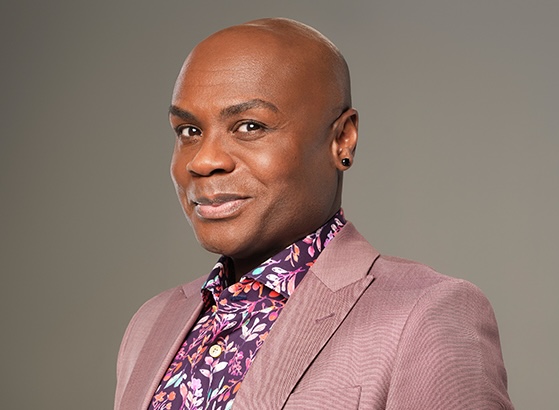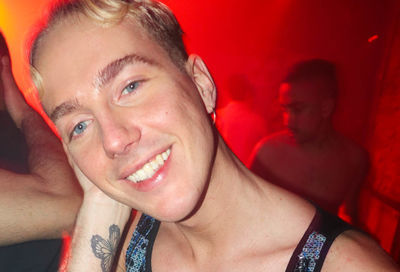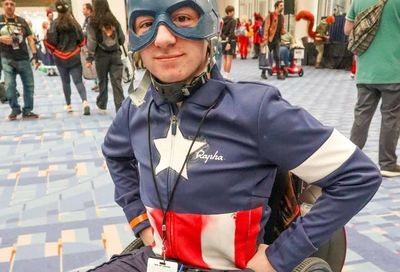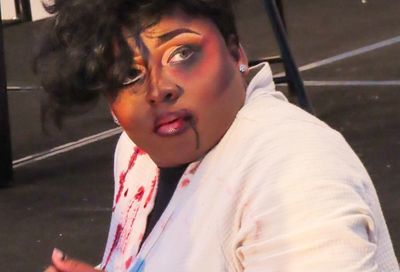Out in the Wild
Maryland's Jake Nodar takes on the Discovery Channel's 'Alaska Experiment' -- and gay stereotypes
Jake Nodar discovered his love of horses when he was just a little boy, toting his “My Little Pony” — the butch version, in navy blue with lightning bolts on its haunches — to school. At 17, he bought his first horse, Cody, and at 20 he went to Colorado to participate in an intensive horse-training program. While he was learning about horses, he was also figuring out something about himself: his sexual orientation. But rural Parachute, Colo., is not the best place to come out.
“Up to that point, I would not let myself even think that I was gay, would not even let that word go through my head,” he remembers, pointing to a fairly strict upbringing of no TV, no radio, and plenty of religion. “With everything I was taught, I was really, really struggling. And I was dealing with these issues in a place where we’d go out to parties and some of the things that would come out of the mouths of these people, it was a little alarming and made my struggle that much worse.”

Jake Nodar
The murder of Matthew Shepard about 350 miles away in Laramie, Wyo., added to his anxiety. But with one fellow student to confide in — the woman who named Nodar’s sexual orientation even when he couldn’t — and an Ellen Degeneres CD, he survived Parachute.
Afterward, back in Maryland, Nodar discovered the Atlantic States Gay Rodeo Association, a gay community where he felt at home, allowing him to further discover himself as a gay man and as a rodeo competitor.
Today, at 30, he owns Jake Nodar’s High Performance Training for horses, a facility in Frederick, Md. Though he loves the horses, Nodar is also a photographer. Planning a trip to Mongolia to photograph horses, an adventurous trip itself, Nodar stumbled into a peculiar happenstance that would change his life in ways he could not have possibly predicted.
“I was getting ready to book the ticket and I was Google-ing ‘Mongolia expeditions,’ and something popped up. It was an Alaska expedition. It was very, very vague as far as the description. I sent an e-mail and said, ‘I’m not really sure what this is, but it sounds interesting.’ The next day, somebody called from casting and they asked me to overnight a video to them. Two weeks later, I was in L.A. Three weeks after that, I was being dropped off by the side of a lake in the middle of Alaska.”
And so began Nodar’s participation in the Discovery Channel’s Out of the Wild: The Alaska Experiment, the finale for which airs Tuesday, June 9.
The premise is simple: A group of strangers are abandoned in the Alaskan interior with the clothes they’re wearing and the packs on their backs. Now find civilization. If you can’t hack it, hit your individual GPS beacon and you’ll be rescued. No “Immunity,” no “Road Block,” and no big cash prize. Just 30 days last autumn of trying to stay fed — think rotting salmon, withering blueberries, porcupine — and the futile, never-ending pursuit of heat. And just one, painfully cold, makeshift shower.
METRO WEEKLY: What did you put in that audition video that sold the Discovery Channel on Jake Nodar?
JAKE NODAR: I had such a short amount of time to get the video done. I threw a camera on a tripod, I hopped on a couple of bales of hay, with horses in the background, and just talked to the camera about who I was and what I did. And I threw in some clips of some of my travels and some of my horse training, and that was that.
MW: So this is a 48-hour process, all this falling into place. When you told your boyfriend, Andrew Scott, you’d be heading out to Alaska, surviving, getting on TV, what was his reaction?
NODAR: I think he was shocked. But right from the get-go he was very supportive. It was as much a surprise to me. I did it completely on a whim, and to get that response so quickly, we were both sort of in shock.
We had actually gone up to visit his family for his birthday and that’s when I got the call saying they wanted me out in L.A., so he’s been very much a part of this and so very supportive.
MW: He had to let you go for 30 days, but now he’s got bragging rights.
NODAR: He does have bragging rights to some extent. I encourage it, actually. [Laughs.]
MW: Being on the Discovery Channel, as opposed to, say, Bravo, you were a novelty as an openly gay man. Your understanding is that you’re the first openly gay man featured on a Discovery Channel show, right?
NODAR: That’s correct.
MW: Were you cognizant of that during shooting?
NODAR: I think before actually going out there, that sort of crossed my mind. But being out there, there were greater concerns and it was never an issue. I was very accepted by the entire group, Discovery never asked me to be anybody other than who I was, and it was great.
One of my big drives for being out there, because of my struggle coming out, is I worry about people who are having a difficult time coming out, whether in the Midwest or these rural towns where it is a lot tougher.
Whether or not it causes a conversation to happen between somebody and their parents, that was such a driving force for not wanting to quit.
MW: Did your own tough coming-out experience help you in Alaska, psychologically? Did it make you more self-reliant, give you greater strength of character?
NODAR: I can’t tell you how much the whole coming-out process has made me a stronger-willed person. Getting through that year was huge. It really has made a lot of these other struggles seem inferior. I’ve always got that in the back of my head, knowing that was a heck of a lot worse back then. It contributed to my mental strength.
And we all found out within the first week or so of being in the Alaskan interior just how important mental strength was.
MW: How many people cried “uncle”?
NODAR: Up to where we are now in the show, there have been four people who have bowed out. It was a shock that within three days the most experienced hunter hit her GPS beacon and was flown out on a chopper.
A day later, the most experienced fisherman and outdoor guide called it quits as well. So it really is a testament to it not being just about knowledge going in there, but the combination of physical and mental strength that really carries you through.
MW: How much face time did you get with the other members of the group before they dropped you in the wilderness?
NODAR: We were not allowed to talk. We had “casting babysitting” that was ridiculous.
The three days we had of survival training, the only time we’d interact at all was if there was a group exercise, but we weren’t allowed to talk about anything personal. Then we had to go to our hotel rooms. They gave us vouchers so we could get room service — we weren’t allowed to eat in the restaurant. They wanted every single social aspect caught on tape and that was painful. That was like being grounded.
MW: That seems extreme, but did it make for better TV?
NODAR: I think it did. And, of course, after how ever many days it was of being told to shut up, we landed [in the wild] and we were all a bunch of chatty Cathys. It was great that they did it that way.
MW: Are these people you are going to be in touch with forever? How close are the relationships you formed with them?
NODAR: The first three people who bailed out we really didn’t have much time to establish much of a connection. The six of us that pushed on from that point are very, very tight. I talk to several of them on nearly a daily basis. Two weeks ago, I had five of them here and we had a big party and watched one of the episodes. They are lifelong friends, no question about it.
MW: How did this compare to coming out in rural, conservative Colorado?
NODAR: It was a completely different kind of test.
I remember one day in particular, I had gone out on a hunt by myself. We had a good bit of snow on the ground and another snowstorm was moving in at the time. We hadn’t eaten in probably three days. I had dropped close to 20 pounds. I was several miles from camp and I remember constantly stumbling and physically having a very hard time just to keep walking forward. I remember thinking to myself, ”You can’t sit down, because if you do you’re not getting back up.”
I’ve never pushed my body physically that much and it’s something I don’t want to repeat.
They were two very different types of challenges: the challenge of coming out and sort of overcoming that hurdle, and then the challenge of surviving Alaska’s wilderness. I think both led to a great deal of personal growth.
MW: What did Alaska teach you about yourself?
NODAR: It taught me that I take everything for granted.
I felt like a princess coming back home. I’d hit a switch and I’d have light. I open the fridge and there’s a steak. It was a full day’s work just to start a fire, get water and go out and hopefully be successful at hunting, which a lot of the times we were not.
It’s amazing just how good I’ve got it.
MW: Do you have any porcupine cravings?
NODAR: Porcupine was pretty damn good. I would eat that again. Out of everything out there, that’s something I would at least attempt again. I won’t do mouse again, I can promise you that.
MW: How are you feeling about blueberries?
NODAR: I feel like hurling a little when I see the blueberries in the grocery store. I’ve had a lifetime supply of those and I don’t want to have another one for a very long time.
MW: So, porcupine — tastes like chicken?
NODAR: Porcupine was actually more like a beef brisket. We tried to eat it right after we finished field-dressing it. We basically threw it on a frying pan for five minutes and found out very quickly that it’s very, very tough. So we boiled it overnight and it was just falling off the bone. It was amazing.
MW: What did you miss most?
NODAR: Food and heat. You never really got warm. We were always wet. You’d wake up in the morning, get out of your sleeping bag and you’d have to put on ice-cold, soaking-wet socks and boots. I missed being warm and full. That never happened out there.
MW: That cold shower looked painful.
NODAR: The cold shower hurt.
MW: Did you take just the one?
NODAR: One shower in 30 days. Pretty nasty. Most of the people went 30 days without a single shower.
MW: Did the experience empower you, or were you already pretty self-confident?
NODAR: It certainly helped. I think the coming-out experience did so much for me in that department, but [the Alaska Experiment] certainly gave that great sense of accomplishment and knowing that I can set my mind to something, do it and do it really well.
MW: What do you think you might have taught the other people in the group, or people watching the show?
NODAR: It’s interesting. The first interview that we did was before we were actually dropped into the wild. They asked me my strengths and weaknesses. And, of course, with weaknesses, I don’t have any. [Laughs.] But I said, ”Being able to make light of really bad situations, being able to keep a sense of humor when most everybody else is miserable.” It was a little bit cheesy. But in watching, it really showed. It was something that other people said really benefited the group.

MW: How did you represent as a gay man?
NODAR: I went out there and I was me. I did whatever needed doing. I always had a good work ethic, running my own business, so I just went out there and worked like hell. That helped the group because if you’re out there working like crazy, other people are a little less likely to just sit around like a sack of potatoes.
MW: Did you encounter any homophobia?
NODAR: I did not. I was probably most concerned with Dan [Rac] the police officer from New Jersey. But he was the one who actually brought the topic up. He let me know that he’s got a relative who’s openly gay, and just made a very big effort to let me know that it was all good with him, which was huge to me. That meant a lot.
MW: With all of you going through this for no cash prize, just for the experience, there must be some common thread running through all of you.
NODAR: When you put the prize at the end, it alters everyone’s interaction. You get that much more cutthroat. In this kind of situation you can’t have that. That kind of unnecessary drama wouldn’t work.
It was people out there who really wanted to test their limits and put themselves to the test and see how far they could go. Jumping off that plane, we all at least had that in common. It’s what made for such amazing bonds.
MW: Was asking for a rescue an option for you?
NODAR: It was not. I thought about pushing Trish [Bulinsky]’s beacon a couple of times. She was a very noisy sleeper and she smelled a little funny. [Laughs.] There were a couple of times at night when I’d sneak over there and try to hit it and she’d usually catch me.
But quitting was not an option. I knew that I could push through. I don’t think that way, even if I have to crawl to the finish line. That’s sort of my mentality.
MW: Tell me about your return to civilization.
NODAR: We were actually in a hotel in a town called Talkeetna, and they threw a bit of a wrap party. It was wild for several reasons. One of which is we were out there with people from production. We weren’t allowed to interact with them at all. These people got to know us inside and out, and here we were meeting them for the first time. That was fantastic.
Then they brought out the food. The funniest thing that happened was that we sat down for dinner probably 45 minutes after we arrived at the hotel. Andrew looks at me and says, “I’m starving!” [Laughs.]
I went to town. I had steak and crab legs and margaritas and wine and hot chocolate. It was like a National Geographic photo of people with distended bellies.
MW: Man does not live by crab legs and margaritas alone. Not to be base, but you and Andrew must’ve had a great reunion after your 30 days without privacy.
NODAR: It took a day or so, mainly because I couldn’t move because I had eaten so much. But we made up for lost time.
We had the wrap party and the very next day we were on the plane flying back. We had that nice, long, nine-hour plane ride together.
Then the settling in began. Mentally, the experience played with us like I was not expecting at all.
MW: How do you mean?
NODAR: I would go for a walk in Old Town, Alexandria — not rural by any stretch of the imagination — and I’d see a squirrel and think, ”Where’s the gun?” If I had to go to the bathroom, I’d think, “Where’s the closest tree?”
The biggest thing was eating. It was probably three weeks that I would get up through the night and I would eat like crazy. Then I felt guilty because I wasn’t “sharing with the group,” so I’d actually hide the wrappers in the bottom of the trashcan. Basically like a bulimic, minus the throwing up.
MW: What makes you proud of the experience? Are you proud of accomplishing something for yourself, or was this something for the GLBT community?
NODAR: I think it’s a combination.
Out there, the last thing we did was sort of sit back and think about what we were doing. We were seriously trying to survive. But I’m very proud of what I did. I’m very proud of how I represented myself and how I handled myself.
And I am really, really proud that I could represent as an openly gay man. That is huge to me. I can’t tell you how much that means to me. I’m very hopeful that it is helping some people out, just seeing me out there, and certainly to be Discovery’s first openly gay man on the air, that’s huge. I think it’s great for Discovery, too, just a big step in the right direction for them.
MW: What sort of viewer feedback have you gotten?
NODAR: Usually Wednesday morning, the day after the show airs, my e-mail box is fairly full with all sorts of comments. The first couple of weeks I was getting all sorts of letters from straight women, which was very interesting. I haven’t had that happen since high school.
MW: Marriage proposals?
NODAR: Somewhat, yes. And they’re in for a surprise when Episode 7 airs [May 26].
I was getting e-mails from deer hunters, from southern Alabama — from all types who were very supportive of me.
I think the way Discovery is doing it, they’re not saying a lot about anyone’s personal side. It really gives everybody a fair chance to get to know me and they can’t make any snap judgments. In Episode 7, they very subtly talk about my boyfriend and I think it’s going to raise a lot of conversations, necessary conversations that need to happen.
MW: What about hate mail?
NODAR: I have received a few pieces of hate mail, one of which was from a distant family member. That was a little bit upsetting, but you know that that’s going to happen because I’m putting myself out there.
But if my being on the show benefits somebody, makes their coming-out process easier, I will take all the hate mail in the world.
Jake Nodar will host a viewing party for the final episode of Out of the Wild: The Alaska Experiment, airing at 10 p.m., Tuesday, June 9, at Nellie’s Sports Bar, 900 U St. NW. For every $3 “Nellie’s Beer” sold that evening, Nellie’s will donate $2 to the Gay & Lesbian Alliance Against Defamation.
Visit Jake Nodar’s High Performance Training at www.jakenodar.com. Visit the Discovery Channel’s Out of the Wild: The Alaska Experiment site at dsc.discovery.com/tv/out-of-the-wild/out-of-the-wild.html.
Support Metro Weekly’s Journalism
These are challenging times for news organizations. And yet it’s crucial we stay active and provide vital resources and information to both our local readers and the world. So won’t you please take a moment and consider supporting Metro Weekly with a membership? For as little as $5 a month, you can help ensure Metro Weekly magazine and MetroWeekly.com remain free, viable resources as we provide the best, most diverse, culturally-resonant LGBTQ coverage in both the D.C. region and around the world. Memberships come with exclusive perks and discounts, your own personal digital delivery of each week’s magazine (and an archive), access to our Member's Lounge when it launches this fall, and exclusive members-only items like Metro Weekly Membership Mugs and Tote Bags! Check out all our membership levels here and please join us today!




















